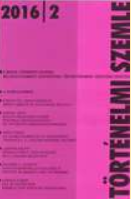Bajcsy-Zsilinszky Endre politikai szocializációja és 1919 előtti ideológiai portréja
The Political Socialization of Endre Bajcsy-Zsilinszky and his Ideological Portrait prior to 1919
Author(s): Ákos BarthaSubject(s): Political history, 19th Century, Pre-WW I & WW I (1900 -1919)
Published by: Magyar Tudományos Akadémia Bölcsészettudományi Kutatóközpont Történettudományi Intézet
Keywords: Endre Bajcsy-Zsilinszky; history; political socialization;
Summary/Abstract: The majority of more important Hungarian settlements have at least one street bearing the name of Endre Bajcsy-Zsilinszky (1886–1944). The name is accordingly widely known, and the politician-publicist, of mixed Hungarian and Slovak origins, executed by the Hungarian fascists, belongs, despite his zigzagged career, to that tiny group of interwar politicians whose basically positive reputation has remained unshaken to this very day. This unusual stability can of course not be separated from the tragic end of his life. Yet by dropping this particular perspective, and interpreting instead each period of his career in its own specific context, one confronts virtually all the problems of Hungarian social and ideological history (nationalism, noble déclassement, agrarian and Jewish problems, assimilation, political radicalism etc.) In the present study I focus on the pre-1919 career of Bajcsy-Zsilinszky, trying to identify those early influences which decisively shaped various sections of his later political life. It is from this perspective that I explore the family background in Békés county, the secondary school years at Békéscsaba, and the university training at Kolozsvár (today Cluj, Romania) and in Germany. Of course, the notorious event of the violent death of the peasant politician András L. Áchim (1911) cannot be skipped over in this context, but alongside the Áchim–Zsilinszky conflict, which has been reconstructed frequently but tendentiously (pro and contra), the author also examines in detail a hitherto unresearched disciplinary procedure from 1909, which could only be settled through the intervention of Károly Khuen-Héderváry, Géza Fejérváry and István Tisza, and sheds important light on the character of young Endre Zsilinszky. Of equal importance was the two years spent in the administration of Árva county (1912–1914), and the publication possibilities offered by Jenő Rákosi on the pages of the Budapesti Hírlap. Finally, the study analyses the controversial individual experiences of the First World War, and the shocking influence of the final collapse, with a special regard to the racial ideology of Zsilinszky, which, gradually taking shape in the course of the preceding years, had become crystallized by the time of revolutions. The study is based on the Bajcsy-Zsilinszky papers now kept in the Manuscript Department of the Hungarian National Library, and archival documents preserved in Hungarian (National Archives, Archives of the Institute for Political History, Institute for the Research of Post-Communist Transition, Library of the Hungarian Academy of Sciences) and foreign collections (Austrian National Archives). The publicistics and individual volumes written by Bajcsy-Zsilinszky were also relied on, and so were parliamentary documents, memoirs and the results of the relevant scholarly literature.
Journal: Történelmi Szemle
- Issue Year: 2016
- Issue No: 02
- Page Range: 203-244
- Page Count: 32
- Language: Hungarian

